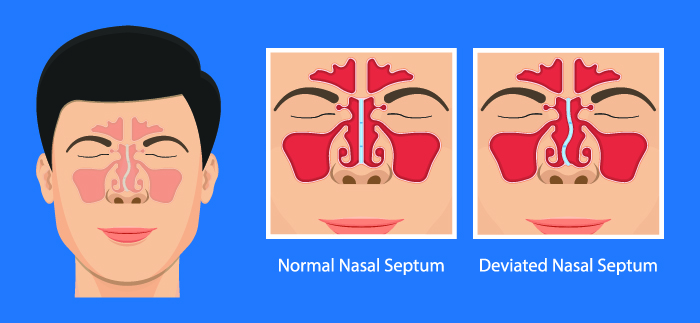Deviated Septum Surgery in Chunni-ganj, Kanpur
A deviated septum is when the wall (nasal septum) between your nasal passages is moved to one side.
What is a Deviated Septum?
The septum is the cartilage that sits at the center and separates the nostrils. Many people have one nostril bigger than the other. This is known as a deviated septum. Having a deviated septum can cause breathing issues.

What are the Symptoms of Deviated Septum?
Possible symptoms of deviated septum include:
- difficulty breathing through the nose
- nosebleeds
- sinus infections
- dryness in one nostril
- snoring or loud breathing
- nasal congestion
What are the Causes of Deviated Septum?
Some people are born with a deviated symptom, whereas others develop it after an injury or strain to the nose. Contact sports, such as fighting and wrestling, are one of the most common reasons due to which deviated septum may occur.
When to See a Doctor?
See your doctor if you experience:
- A blocked nostril
- Difficulty in breathing
- Frequent nosebleeds
- Recurring sinus infections
Request an appointment at Apollo Spectra Hospitals, Kanpur
Call1860-500-2244 to book an appointment
What are the Complications of Deviated Septum?
If left untreated, a deviated septum can cause complications such as obstruction of one or both nostrils. This can cause:
- sinus problems
- loud breathing during sleep
- disrupted sleep
- only being able to sleep on one side
- dry mouth
How is Deviated Septum Diagnosed?
At Apollo Spectra, Kanpur, your doctor will discuss your symptoms and check the septum’s placement by using apparatus and light. This will help them detect the issue.
How can we Treat Deviated Septum?
Sometimes, symptoms of a deviated septum can be treated with medications. In other cases, your doctor at Apollo Spectra, Kanpur may prescribe other treatment options such as:
- Deviated Septum Surgery - During this surgery, the surgeon will straighten your nasal septum and reposition it in the center of your nose. The surgeon will cut the septum and take out excess cartilage or bone. You’ll be monitored immediately after the surgery to check for complications.
- Nasal steroid sprays - Prescription nasal corticosteroid sprays can reduce swelling in your nose. It is important to follow your doctor's instructions while using these.
- Antihistamines - Antihistamines are medications that help prevent allergy symptoms. They can also occasionally help non-allergic conditions such as a cold.
- Decongestants - Available as a nasal spray or a pill, decongestants enable the opening of airways on both sides and reduce nasal tissue swelling.
If your symptoms persist despite these treatments, your doctor may suggest a surgery called septoplasty.
How can we Prevent Deviated Septum?
You can avoid a deviated septum by taking these precautions:
- Wearing a seat belt when riding in any vehicle
- Wearing a helmet when playing contact sports
What are the Risk Factors for Developing a Deviated Septum?
Risk factors include:
- Not wearing your seatbelt or helmet while riding in a vehicle
- Playing contact sports
Conclusion
A deviated septum may not cause any problems. But in some cases, it can lead to several issues. If you have a deviated septum that may need treatment, discuss your options with your doctor.
This surgery takes around 45 to 60 minutes.
Septoplasty cures sleep apnea. It will also allow you to breathe without any problems.
- There may be extreme bleeding during and after the surgery.
- Your nose might slightly change in shape after this surgery.
You must discuss all the aspects of your condition and the surgery with your surgeon before the procedure.
Symptoms
Our Doctors
DR. SANJEEV KUMAR
MBBS,MS...
| Experience | : | 34 Yeras Experience |
|---|---|---|
| Speciality | : | ENT, Head and Neck S... | Location | : | Chunni Ganj |
| Timings | : | Available by prior a... |
DR. LAXMI TANDON
BDS...
| Experience | : | 16 Yeras Experience |
|---|---|---|
| Speciality | : | Dental and Maxillofa... | Location | : | Chunni Ganj |
| Timings | : | Mon - Sat : 9:00 AM ... |
DR. ALOK GUPTA
MD (Gen Medicine), D...
| Experience | : | 33 Yeras Experience |
|---|---|---|
| Speciality | : | General Surgery & Ga... | Location | : | Chunni Ganj |
| Timings | : | Mon - Sat : 10:00 AM... |
DR. ARUN KHANDURI
MBBS, MD (Gen. Med),...
| Experience | : | 36 Yeras Experience |
|---|---|---|
| Speciality | : | General Surgery & Ga... | Location | : | Chunni Ganj |
| Timings | : | Mon - Sat : 10:00 AM... |
DR A P SINGH
MBBS,DLO...
| Experience | : | 14 Yeras Experience |
|---|---|---|
| Speciality | : | ENT, Head and Neck S... | Location | : | Chunni Ganj |
| Timings | : | Available by prior a... |
DR. KARTIK AGARWAL
MBBS, MD - General M...
| Experience | : | 6 Yeras Experience |
|---|---|---|
| Speciality | : | Gastroenterology... | Location | : | Chunni Ganj |
| Timings | : | Mon to Sat : 5:00 PM... |
Our Top Specialities
NOTICE BOARD
CONTACT US
CONTACT US
 Book Appointment
Book Appointment








.svg)
.svg)
.svg)
.svg)








